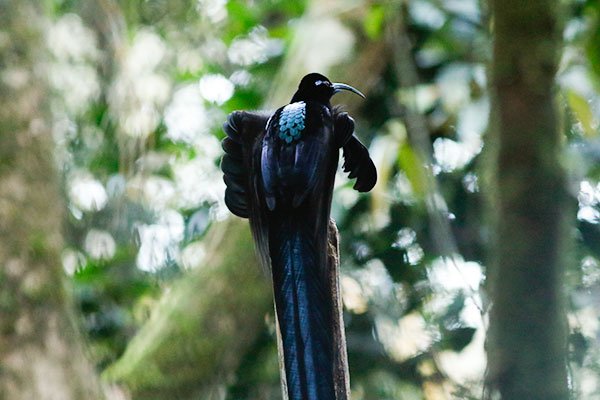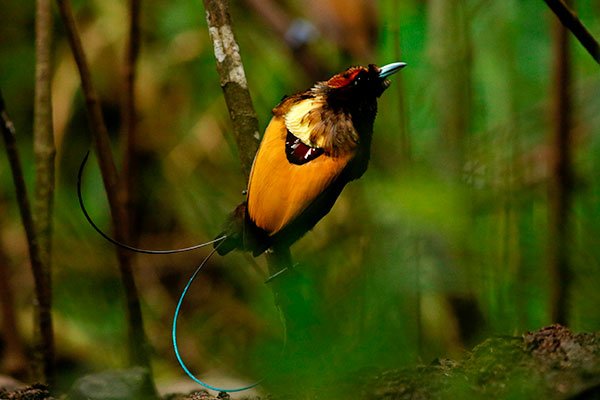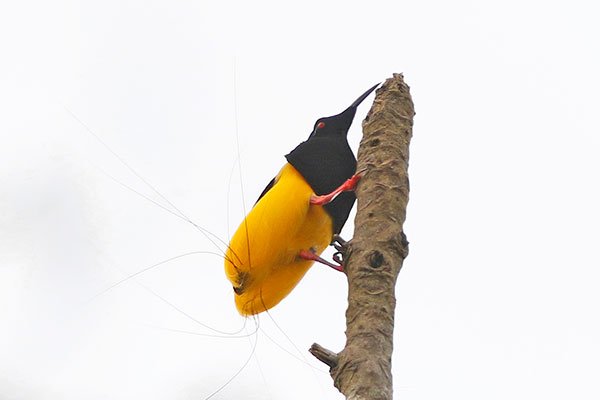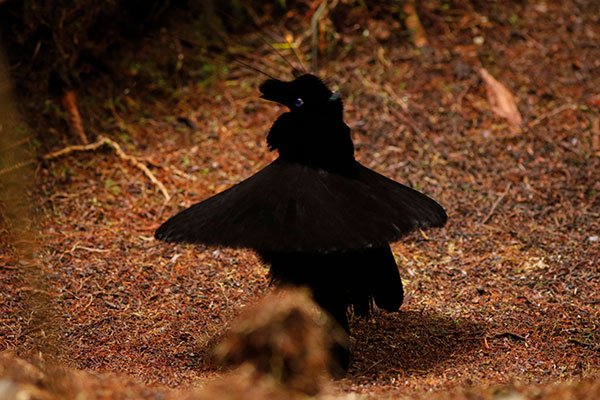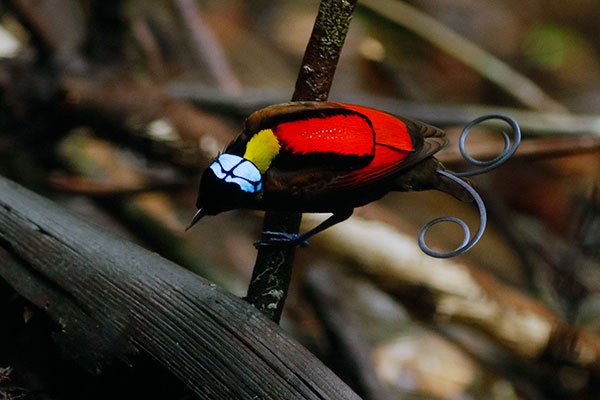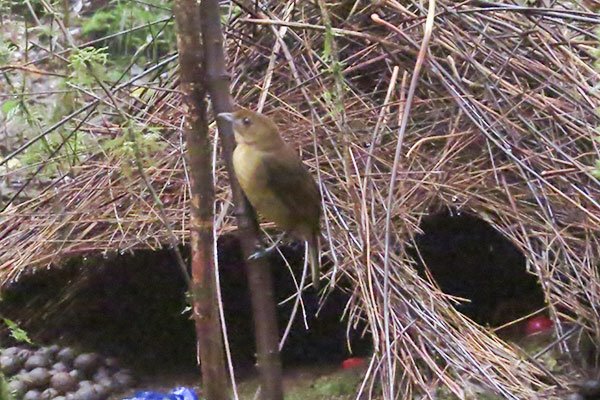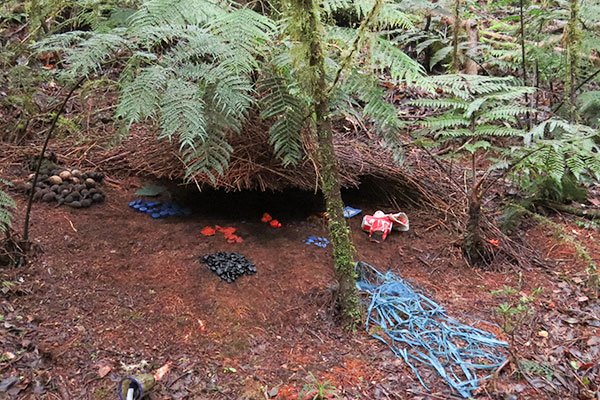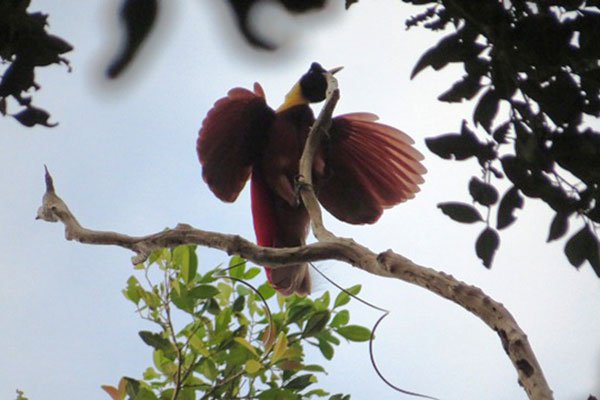West Papua Birding 28 Days 27 Nights
Sorong - Waigeo - Arfak - Wamena - Baliem Valley Snow Mountain - Lake Habbema - Nimbokrang - Biak - Numfor Island BookingDay 1: The tour begins from Sorong on west Papua and you will be picked up at the airport Sorong to transfer to a hotel for overnight stay. Contact us to organize your domestic flights.
Day 2: Morning we will be birding in forests ouside of Sorong before leaving to Waigeo island next to Batanta, Raja Ampat. We will stay for three nights in Waigeo.
Days 3-4: Waigeo is the best place to see Wilson’s Bird-of-Paradise, close and easy walk to get to their display grounds comparing to Batanta. We will watch the bird from a constructed hides where we will have good chances to enjoy a male in full action calling and displaying vigorously to any females enter to his displaying arena. Around this area also productive any good birds such Black-sided Robin, Wompoo Fruit-dove, Raja Ampat Pitohui, and the shy Western Crowned Pigeon. Another main target is Red Bird-of-Paradise. If it is in good fortune we may see around ten males or more in their displaying tree arena calling for several females entering their arena and we may ejoying watching the birds everage for an hour or more in their displaying tree.
Day 5: After a final morning on Waigeo we return and overnight in a hotel.
Day 6: We will make some preparations in town on the west shore of Geelvink Bay, then drive up into the Arfak Mountains. We will stay for six nights at a basic guesthouse which is already developing and comfortable comparing some years ago. The accommodation is in a birding site village in a slope of Arfak mounts situated at 1600m. We will organize well what to do best during our birding in the Arfak.
Days 7-11: In Arfak we will have five full days exploring the forest in three different sites – at top we focus and become target birds to see are such Spotted Jewel-babbler, Arfak Astrapia, Black Sicklebill, Western Smoky Honeyeaters, Vogelkop Melidectes and Vogelkop Bowerbird. Papuan Lorikeet and Smoky Robin are also accuring around possible to see. The next morning we will walk down in narrow tracks to Western Parotia site and expect to see the bird mating in the afternoon. Our regular site is visiting Western Parotia site expecting to see the bird from a hide. It takes very long time and need long patience waiting in a hide until the male of Western Parotia comes into the dancing ground arena calling for some females entering into the dancing ground arena then we have chance watching the male display the extravagant ‘ballerina dance’. Not far from this site we still hope to see Vogelkop Bowerbird in his mating site. Our last visit is visiting Magnificient Bird of Paradise very close to the main road and easily access.
We also expect to see such Vogelkop Scrub-wren, Perplexing Scrub-wren, Black Fantail, Friendly Fantails and Mountain Melipaga, etc. We also expect to see Mountain Owlet Nightjar and Felline Owlet Nightjar in roosting tree.
Day 12: This day is our happy hour birding just from main road and expect to see such Masked Bowerbird, Variable Pitohui, Josephine’s Lorikeet, and Black-chinned Robin etc. We will leave the area to the town for an overnight stay in a nice hotel.
Day 13: We will use the day to explore nearby grasslands where it is often possible to find for such Grand Manikin, and Chestnut-breasted Manikin near the lake.
Day 14: After make preparations we will continue the journey driving up with 4WD vehicles to the fabled Snow Mountains and in particular the Grand Baliem Valley. The journey is along winding roads, through wonderful forests where we will make several birding stops in search of our first specialties such Black-breasted Manikin and Mountain Kingfisher, etc.
Days 15-17: During our stay in this area we will explore some areas such near the lake Habbema and surounding areas where we will explore and expect to see for some dificult birds such Greater Ground Robins, Lesser Melampitta, Crested Berrypecker, Spended Astrapia, Giant Wattled Honeyeater which was Macgregor’s, Papuan Lorikeet, Papuan Scrub-wren, Plam-faced Lorikeet, Yellow-billed Lorikeet, Painted Tiger Parrot, and New Guinea Woodcock. We may also birdwatch such Western Alpin Manikin, Common Smoky Honeyeater, Belford’s Melidectes, Short-bearded Melidectes, Black-throated Honeyeater, Orange-cheeked Honeyeater, Red-collared Myzomela, Grey-streaked Honeyeater, Lorentz’s Whistler, Alpin Pipit, etc. We will also search other special birds Snow Mountain Quail that are often flushed from the grasslands and Papuan Harrier often flying at more open areas.
Day 18: Our last day in the morning we will have happy hour birding. We still also focus to some birds that more difficult to find around the lake such Brown Sicklebill which more easy and I have always seen it at the same area for several my birding trips in the area. Other birds such Black Sittella, Western Mountain White-eye, Superb BoP, and Black-breasted Manikin are also possible around here. We will return to small town in Wamena for an overnight stay.
Day 19: We will drive to Nimbokrang at the lowland forests which is bird-rich area for overnights stay at a basic homestay and will explore to this bird-rich area in the afternoon.
Days 20-22: We will explore the lowland forest of Nimbokrang and an old logging road expect to see such Twelve-wired Bird of Paradise, Lesser Bird of Paradise, King Bird of Paradise, Pale-billed Sicklebill, Rufous/Papuan Babbler, Blue-back Kingfisher, a rare Shovel-billed Kingfisher, Rufous-bellied Kookaburra, Salvadori’s Fig-Parrot, Rainbow Lorikeet, Brown Lory, Sulphur-crested Cocatoo, Palm Cocatoo, Yellow-faced myna, Red-flanked Lorikeet, Western Black-capped Lory, Crimson Finch, Hooded Manikin, Streak-headed Manikin, etc.
Day 23: After a final day of birding in these tropical lowland forests we will leave this area for an overnight stay.
Days 24-25: This morning we will fly to Biak and the rest of the day is rest or make an easy birding at cultivation forest near Biak and the next day long drive to a best forest where we will be birding and expect to see for our Biak endemics such Biak Black Flycatcher, Biak Monarch, Golden Monarch, Biak Paradise Kingfisher, Biak Lorikeet split from Rainbow Lorikeet, Biak Red Lory, and Biak White-eye. We will have lunch picnic. In the evening we will try to spotlight the endemic Biak Scops Owl which is usually difficult to see, and the rather more conspicuous Papuan Frogmouth. Night in Biak.
Day 26: After some final birding on Biak we travel by boat to Numfor island for an overnight in a basic guesthouse on Numfor.
Day 27: Our main target bird here is Numfor Paradise Kingfisher which is quite common on this island. Beach Kingfisher is also possible seeing it here. In the afternoon we return to Biak for an overnight stay.
Day 28: Tour ends. Transfer to the airport to make a connecting with your international flight.
Please note this itinerary is open to change at any time due to continuing changes in internal flight schedules.
Maximum: 8 pax
Tour Cost: Contact us for best cost.
The Cost includes: all accommodation, all internal flights, all main meals, drinking water, overland transportation, entrance fees, and guide fees. For booking and flights, please contact us. We will arange your internal and domestic flights to suitable with the itinerary.
The Cost excludes: international flights, domestic flights, departure taxes, overweight of luggage, lost/dumage of luggage, insurance, medicals and hospitality, drinks, donations, tips, and other items of a personal nature.
Accommodation: often basic but comfortable twin-bedded and single rooms, some with private facilities, though shared facilities are only possible at some places, regular camping.
Walking difficulty: moderate – arduous treks


